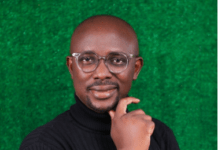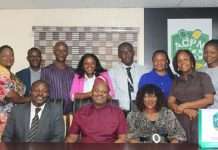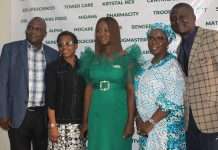Second from right, Pharm. Regina Ezenwa with other members of the team, presenting gift items to one of the widows.
The story of the Roses Widows’ Day is a unique one, which started with only 35 widows in a small room, but has now grown up to over 800 widows during this year’s celebration. Spearheading this success story is no other person than Pharm. Regina Ezenwa, managing director, Rozec Pharmacy Ltd. Ezenwa received the call to care for the widows and the needy in the nineties, prompting her to start Roses Ministry. Since then, she has not allowed her professional obligations to hinder her from the extra role she was divinely assigned.
Althoug, the Roses Ministry has different departments – for the youths, the elderly and the widows-, this year’s Widows Day was outstanding, with lots of gifts for the women called ‘wives of Jesus’, to take home. Aside from food and clothing items, the widows’ health was also taken care of, as they were screened and given drugs by medical doctors alongside Association of Community Pharmacists of Nigeria members from Surulere branch. Temitope Obayendo had a chat with Pharm. Ezenwa at the event. Excerpts:
As a Fellow of the Pharmaceutical Society of Nigeria, what informed your decision to form an NGO?
Sometime in the 90s, as I submitted myself to the Lord as a willing vessel in the Full Gospel Business Men’s Fellowship International, the Lord began to speak to me: “feed my people.” Understanding feeding to mean giving people foodstuffs and spiritual foods, I did this, both at my community pharmacy and other places. As I ministered the word to people, their lives started changing, and I felt I was there. I had received the name in the 90s – “the Roses”; the Lord made me understand that that was the name, and I penned it down.
By 2006, however, the passion had become stronger, and it occurred to me that what I was doing was not what God was actually asking from me. Towards the end of that year, I was in a state where I was not aware of my physical condition (trance). In that state, the Lord appeared to me and said “the time is now”. The Lord gave me the words in Matthew 25: 35-36, “… I was hungry, you fed me, I was thirsty, you gave me drink, I was ill and you visited me…”
That passage became huge to me, and I asked myself, “Where do I start from?” I told my friends about the vision, and many of them offered to join me.
How was starting up like, with little or no resources?
We visited a school for the partially deaf and dumb at Surulere. We had a wonderful time with them, as we shared food and other things with them, and we went home fulfilled. After we had done this visitation for a while, it occurred to us that we needed a prayer backing; so we started from my sitting room. After a while, my sitting room was no longer conducive for us, as the number continued to increase. Thus we had to rent a space at Tantalizers that could accommodate up to 50 people. Eventually the Lord relocated us here, when our former place became too small for us.
Looking backward, what was the first Widows’ Day like?
In January 2007, the Lord said to me to show his love to these women (widows) whom He called His wives. The very first Widows’ Day, we had about 35 widows. We had foodstuffs in small bags and also wrappers (fabric) for each of the women. The widows felt the love of God in their lives. This was how the 35 widows we started with grew to 804 widows this year.
Thereafter, were there other additions to the programme?
As we continued with the widows, we discovered that some of them were dying due to terminal diseases. So by 2009, we started medical intervention by screening them for high blood pressure and diabetes, as well as referring them to hospitals. But many of them returned to us to say they didn’t have money to pay to doctors. So we adopted the screening as part of the Widows’ Day last year. Thus for this year’s programme, we split it into two days – the first was for the medicals, which was in collaboration with the ACPN, Surulere Zone, and some doctors who offered their services to some patients who wished to see them.
Through this medium, we have consistently given drugs to our hypertensive widows on a quarterly basis. We give them three-month packs of antihypertensive, and the diabetics have also been receiving free treatment too. I am glad to say that it was the Lord’s leading, because there was no patient that came for the medicals that was not attended to. Other drugs for malaria, anti-inflamatory, cough and catarrh were also dispensed to patients who needed them. We are really grateful to all companies who partnered with us on drugs and other items.
From the medical screening conducted, what would you say is the predominant health challenge of widows?
From the screening conducted, it was discovered that the biggest health challenge of the widows is hypertension, as over 300 of them were found with the condition. Managing hypertension has to do with lifestyle, and we counselled them on low salt, low oil, more exercise, adequate rest, and staying away from undue worry.
How do you hope to continue funding this project?
We have nothing of our own to support these widows, except individuals and few pharmaceutical companies. We urge government and bigger organisations to look for credible NGOs like us to support. We have credible team members who are contributing their time, talents and treasures. If we have corporate sponsorship, then we will be able to establish these women much more. We need funding to set up these widows in the different skills they have acquired, so that they will be able to cater for their families.













meds without a doctor prescription: https://genericwdp.com/ pills without a doctor prescription
tadalafil gel: http://tadalafilonline20.com/ tadalafil online